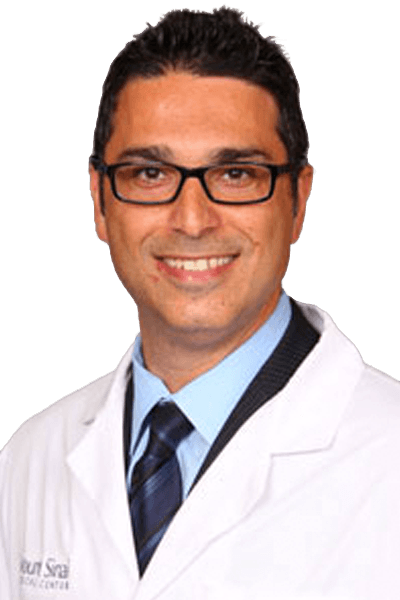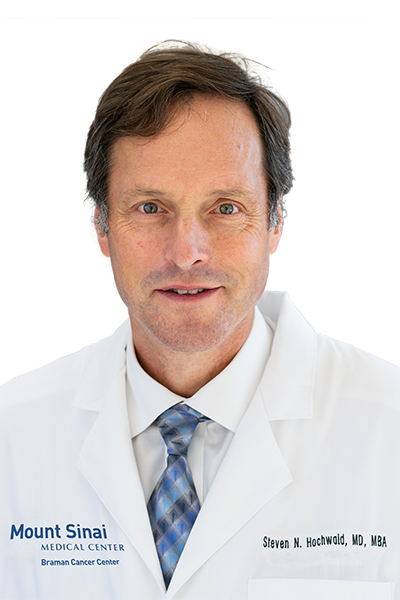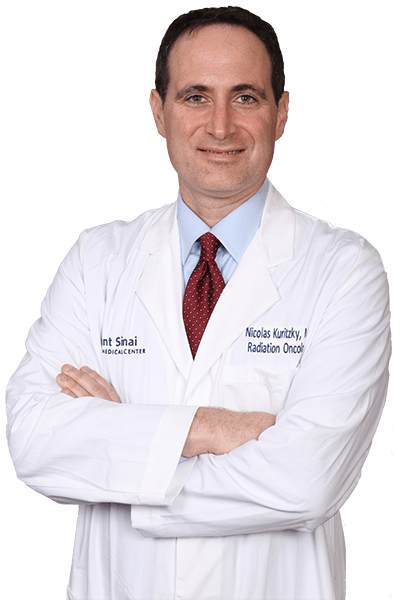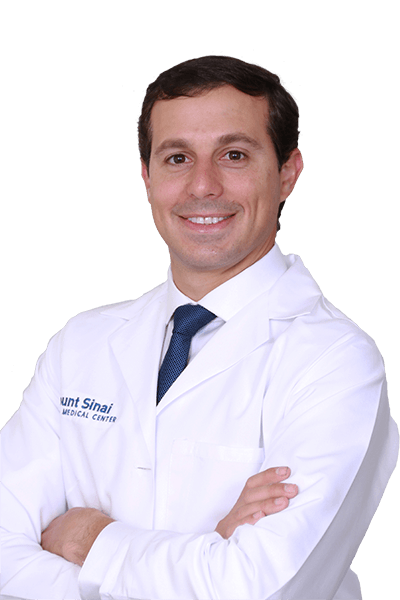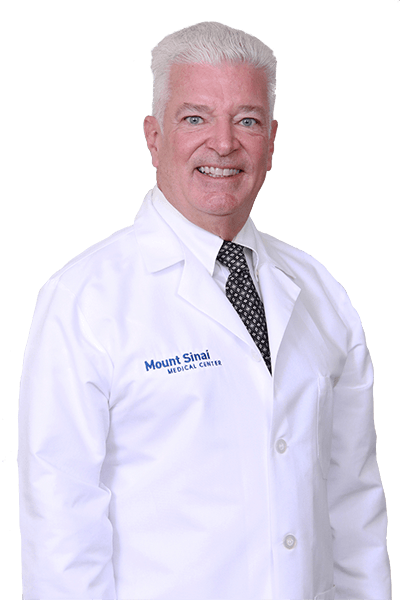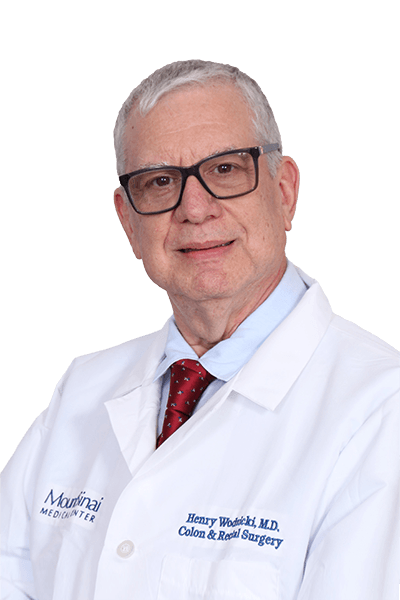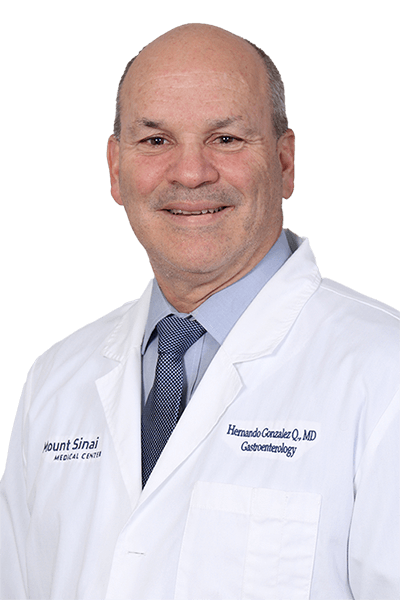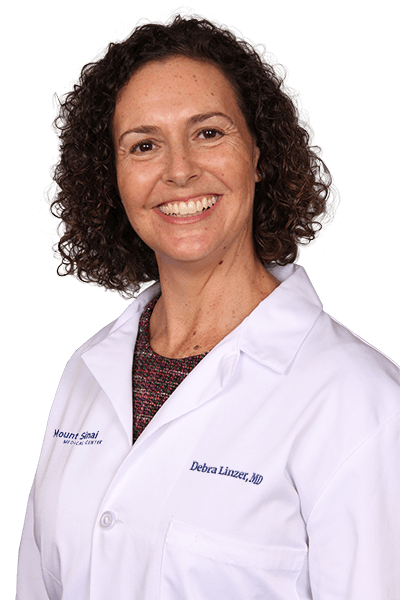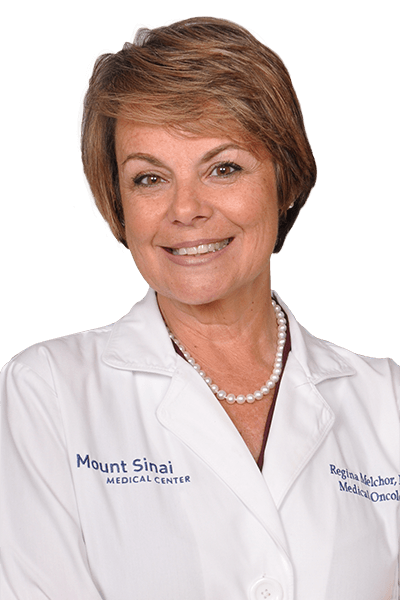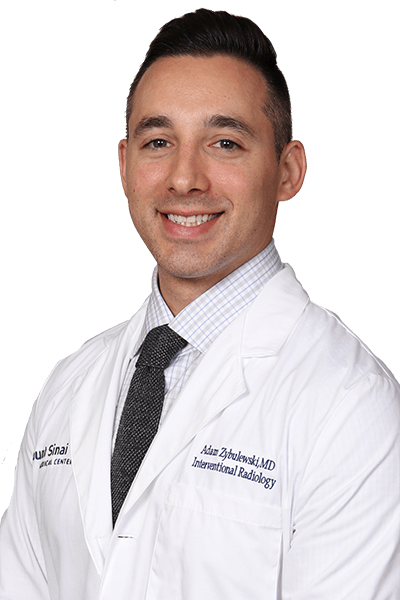Colorectal Cancer
Colorectal cancer is the third most common cancer in the U.S., excluding skin cancer. Each year, more than 150,000 Americans face a colorectal cancer diagnosis. Despite advances in screening and early detection, colorectal cancer is the fourth leading cause of cancer-related death. Fortunately, in many instances, colorectal cancer can be cured if detected early. What’s more, regularly scheduled screening for colorectal cancer can prevent the disease in the first place.
The term “colorectal cancer” refers to cancers that start in the colon, or large intestine, and to cancers that start in the rectum. The rectum is the bottom part of the colon that holds stool until you feel the urge to go to the bathroom. Because the rectum and colon are connected, and because the cellular appearance of colon and rectal cancer are quite similar (or the same), we group colon and rectum cancer together as colorectal cancer.
Colorectal cancer usually starts as a polyp, which is a mushroom-shaped growth on the inner lining of the rectum or colon. If these polyps are not removed, they can turn cancerous and spread through the wall of the colon to other parts of the body.
While regular screening colonoscopies have made a dramatic, positive impact in reducing colon and rectal cancer rates among people age 50 and older, more and more patients develop colorectal cancer as younger adults. In fact, colorectal cancer can develop even among teenagers and people in their 20s. In these cases, patients usually experience abdominal pain; bowel problems, including constipation or diarrhea; pencil-thin stools; and blood in the stool, in the toilet after a bowel movement, and on toilet paper.
At Mount Sinai’s Comprehensive Cancer Center, we provide patients with colorectal cancer screenings to diagnose and prevent colorectal cancer. And when we detect the presence of colon cancer, our multidisciplinary team goes to work to develop the most effective treatment plan while preserving the highest quality of life for every patient.
Colorectal Cancer Screening
The physicians at Mount Sinai’s Comprehensive Cancer Center advocate for regular screening for colorectal cancer. That’s because when our Mount Sinai gastroenterologists and colorectal surgeons detect and remove polyps during a screening colonoscopy, they can literally prevent those polyps from developing into cancer. No question, regular screening for colorectal cancer, starting at age 45, can save lives.
At Mount Sinai, we follow the American Cancer Society’s recommendations for screening colonoscopies, starting at age 45 for people with average risk of developing colorectal cancer. Your Mount Sinai gastroenterologist or colorectal surgeon will discuss with you how frequently to have additional screenings as you age. But typically, most patients only require a colonoscopy every 10 years. At Mount Sinai, we continue to screen patients for colorectal cancer well into their 70s and 80s.
Colonoscopy
You’ll need to prepare for your colonoscopy a couple of days before the procedure. Your Mount Sinai team will prescribe a liquid diet and medicine to empty your entire bowel.
During the colonoscopy, you will be under a light anesthesia, so you won’t feel or remember the procedure. Your Mount Sinai doctor will insert a colonoscope (a flexible tube with a light and camera) through the anus, up the rectum and colon, all the way to the cecum, where the large intestine and small intestine meet. If your Mount Sinai physician sees a polyp, she or he can remove it using a tool connected to the scope. (A Mount Sinai pathologist will examine the polyp under a microscope to determine if the cells are normal or cancerous.)
Cologuard
The FDA approved a colorectal cancer screening test called Cologuard, which only requires a stool sample. This noninvasive test can detect cancer DNA in a patient’s stool. While many patients may choose this option, Cologuard may occasionally return false positive results. In those cases, your Mount Sinai physician will need to conduct a visual exam with a colonoscopy. In addition, Cologuard does not detect all colorectal cancers. With this in mind, Cologuard may be a good option in between colonoscopies or for patients who are older, and who have had negative colonoscopies in years past.
Genetics and Colorectal Cancer
Similar to breast cancer, some patients may inherit gene mutations that increase the likelihood of developing colorectal cancer. Sometimes, patients who have these genetic predispositions may develop colorectal cancer much earlier than most patients, even when they are very young. Even if you do not have an inherited form of colon cancer, some genetic mutations will be important in determining the best treatment for your tumor. At Mount Sinai, we routinely perform genetic analysis for most colorectal cancers. Results of these genetic studies are utilized to determine the most appropriate treatment.
Inherited colorectal cancers are quite rare. As the name implies, familial adenomatous polyposis (FAP) affects families and can develop at a relatively young age. With FAP, patients develop many, many tumors — sometimes thousands — along the lining of the colon. At Mount Sinai, our GI cancer experts typically remove the entire colon for patients with FAP to prevent recurrence. In fact, some patients at high risk have their colon removed as a precaution even before cancer develops.
Another inherited colorectal cancer, Lynch syndrome, requires genetic analysis of the patient’s tumor as well as evaluation of a characteristic called “microsatellite instability” to confirm a diagnosis. Colorectal cancer patients with Lynch syndrome do not respond well to chemotherapy. However, immunotherapy and other targeted therapies can be effective alternatives.
If you have multiple family members who have or have had colorectal cancer, the GI cancer team at Mount Sinai can provide genetic testing to determine if you or other members of your family face increased risk of developing colorectal cancer.
Rectal Cancer
Rectal cancer falls under the umbrella of “colorectal cancer,” and affects the rectum, which is the lowest part of the large intestine that connects the colon to the anus. The rectum stores stool, and it’s the part of the colon responsible for controlling your bowel movements. Like other colorectal cancers, rectum cancer can be detected early when it is highly treatable by having a screening colonoscopy to detect precancerous polyps. Because rectal cancer is more common in younger adults, it’s important to begin screening at age 45, the newer, younger age recommended by the American Cancer Society.
If polyps develop into cancer, patients may experience symptoms like blood in the stool, consistent constipation, and smaller stool sizes. About 20% of rectal cancer patients are genetically susceptible due to hereditary patterns. In fact, genetic testing can be done to identify rectal cancer in its early stages.
Treatment:
Rectal cancer treatment depends on the stage of disease. In addition, genetic analysis of a patient’s tumor can help select the most appropriate treatment. The cancer specialists at Mount Sinai’s Comprehensive Cancer Center will ensure you receive the proper care. We will employ personalized, targeted chemotherapy based on the mutations specific to your cancer.
Stage I rectal cancer typically requires surgery to remove the cancerous polyp, along with some or all of the rectum and possibly part of the colon. While patients may require a bag on the outside of the body to empty their stool, most Stage I rectal cancers do not require chemotherapy. Stage II and Stage III rectal cancer are usually treated with a combination of chemotherapy, radiation therapy, and surgery. Stage IV rectal cancer — when cancer has spread to distant parts of the body — is treated with a combination of therapies to prevent further spread of the cancerous cells.
To learn more about Mount Sinai’s innovative and minimally invasive approach to rectal surgery, click here.
Support, Including Ostomy Support
Mount Sinai’s Comprehensive Cancer Center’s multidisciplinary team includes behavioral health professionals trained in psychosocial oncology. Here, patients and their families can get the emotional support they need as they face the challenges of cancer treatment, as well as the challenges of life after cancer.
In the case of colorectal cancer, some patients require a surgical procedure called an ostomy, where a Mount Sinai surgeon will create an incision in the abdomen to allow solid waste to leave the body and collect in a bag attached to the belly. Transitioning to life with an ostomy can be challenging, but Mount Sinai’s therapists can make the process easier. In addition, Mount Sinai also offers support groups where patients facing similar experiences can share stories, tips, and tricks for others in the same circumstance.
Our Physicians
Kfir Ben-David, MD
Roni Jacobson Endowed Chairman of Surgery
Program Director, General Surgery Residency
- Cancer
- General Surgery
- Surgical Oncology
- Robotic Surgery
- Bariatric
- Gastroenterology
- Mount Sinai Medical Center (Main Campus)
- 305.674.2397
- Mount Sinai Medical Center (Main Campus)
- 305.674.2240
Mike Cusnir, MD
Chief, Division of Hematology & Oncology
Co-Director, Gastrointestinal Malignancies
Assistant Professor at the Columbia University Division of Hematology/Oncology at Mount Sinai Medical Center
- Cancer
- Oncology
- Medical Oncology
- Hematology/Oncology
- Mount Sinai Medical Center (Main Campus)
- (305) 535-3300
- Mount Sinai Emergency Center, Physician Offices, Cancer Center and Diagnostic Center Aventura
- (305) 692-5400
Steven N. Hochwald, MD, MBA, FACS
Director of the Comprehensive Cancer Center
Chief of Surgical Oncology
Associate Director of the Mount Sinai-Columbia University affiliation at Mount Sinai Medical Center
- Surgical Oncology
- Cancer
- Esophageal Cancer
- Gastric Cancer
- Pancreatic Cancer
- Liver Cancer
- Metastatic Cancer to Liver
- Gastrointestinal and Endocrine Tumors and Associated Malignancy
- Mount Sinai Medical Center (Main Campus)
- 305.674.2397
- Mount Sinai Medical Center (Main Campus)
- 305.535.3400
- Mount Sinai Emergency Center, Physician Offices, Cancer Center and Diagnostic Center Aventura
- 305.692.5400
There are no results
Kiranmayi Palla Muddasani, MD
Assistant Professor at the Columbia University Division of Surgical Oncology at Mount Sinai Medical Center
- Cancer
- General Surgery
- Colorectal Surgery
- Surgical Oncology
- Mount Sinai Medical Center (Main Campus)
- 305.674.2177
- Mount Sinai Emergency Center, Physician Offices, Cancer Center and Diagnostic Center Aventura
- 305.692.1010
Aron Simkins, MD
Associate Professor at the Columbia University Division of Hematology/Oncology at Mount Sinai Medical Center
- Cancer
- Hematology/Oncology
- Lung Cancer
- Gastrointestinal Malignancies
- Mount Sinai Medical Center (Main Campus)
- 305.535.3300
- Mount Sinai Emergency Center, Physician Offices, Cancer Center and Diagnostic Center Aventura
- 305.692.5400
Manuel Viamonte, MD
Assistant Professor at the Columbia University Division of Surgical Oncology at Mount Sinai Medical Center
- General Surgery
- Colorectal Surgery
- Mount Sinai Medical Center (Main Campus)
- 305.674.2177
- Mount Sinai Emergency Center and Primary & Specialty Care Hialeah
- 786.584.5555
- Mount Sinai Primary & Specialty Care Coral Gables
- 305.441.0910
Henry Wodnicki, MD
Assistant Professor at the Columbia University Division of Surgical Oncology at Mount Sinai Medical Center
- Colorectal Surgery
- Mount Sinai Medical Center (Main Campus)
- 305.674.2121
Raul A Cortes-Ladino, MD
- Psychiatry
- Cancer
- Mount Sinai Medical Center (Main Campus)
- (305) 535-3300
- Mount Sinai Emergency Center, Physician Offices, Cancer Center and Diagnostic Center Aventura
- (305) 692-5400
Hernando Gonzalez Quiros, MD, FASGE
- Gastroenterology
- Mount Sinai Medical Center (Main Campus)
- 305.674.2240
- Mount Sinai Emergency Center, Physician Offices, Cancer Center and Diagnostic Center Aventura
- 305.692.1080
Debra Linzer, MD
- Cancer
- Radiation Oncology
- Mount Sinai Medical Center (Main Campus)
- 305.535.3400
- Mount Sinai Emergency Center, Physician Offices, Cancer Center and Diagnostic Center Aventura
- 305.692.5400
Regina Melchor, PsyD
- Clinical Psychology
- Mount Sinai Medical Center (Main Campus)
- 305.535.3300
- Mount Sinai Emergency Center, Physician Offices, Cancer Center and Diagnostic Center Aventura
- 305.692.5400
Adam R Zybulewski, MD
- Vascular & Interventional Radiology
- Mount Sinai Medical Center (Main Campus)
- 305.674.2071
- Mount Sinai Emergency Center, Physician Offices, Cancer Center and Diagnostic Center Aventura
- 305.692.1072
- Mount Sinai Specialty Care Key West I Cardiology, Urology & Vascular Care
- 305.294.8334


